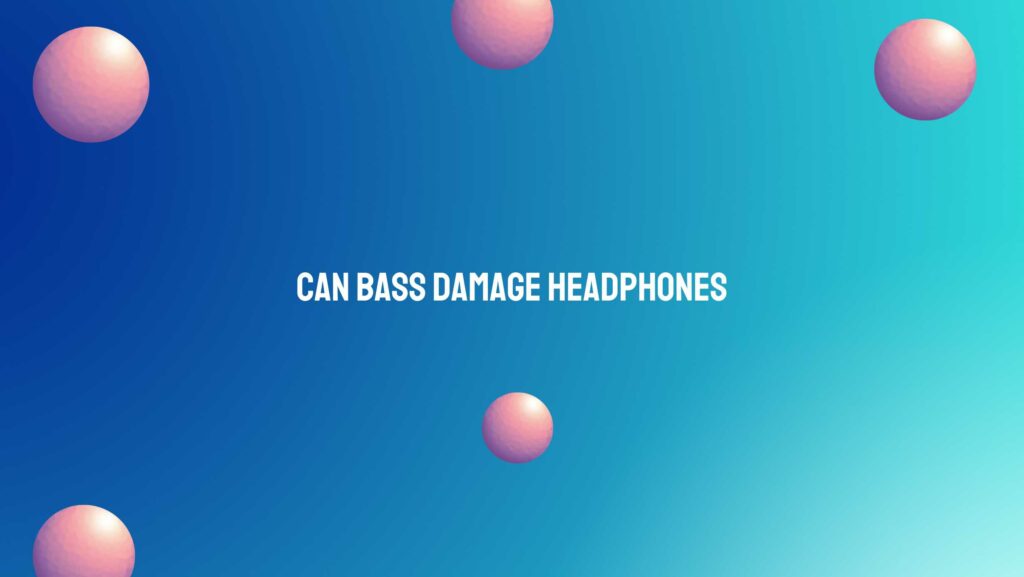Headphones are essential tools for music lovers and audio enthusiasts, providing an immersive listening experience. While they are designed to faithfully reproduce a wide range of frequencies, including bass, there is a common concern: can bass damage headphones? In this comprehensive article, we will delve into the factors that can impact headphone durability and whether excessive bass can lead to headphone damage.
Understanding Headphone Components
To understand how headphones respond to bass and potential damage, it’s crucial to grasp their key components:
- Diaphragm: The diaphragm is a thin, lightweight material that vibrates in response to audio signals. It is responsible for generating sound waves that we perceive as music.
- Voice Coil: The voice coil is a coil of wire attached to the diaphragm. When an electrical signal flows through the voice coil, it interacts with the magnetic field generated by the headphone’s magnets, causing the diaphragm to move.
- Magnetic Assembly: The magnetic assembly consists of magnets that create a magnetic field. This field interacts with the voice coil, facilitating the diaphragm’s movement.
- Ear Cups and Ear Pads: The ear cups house the diaphragm, voice coil, and magnets. They are designed to isolate sound and provide comfort during extended listening sessions.
- Cables and Connectors: The cables transmit the audio signal from the source to the headphones. Connectors ensure a secure electrical connection.
Can Bass Damage Headphones?
Headphones are generally engineered to withstand a wide range of frequencies, including bass, without suffering damage. However, there are specific scenarios in which excessive bass can potentially harm headphones:
- Overexcursion: Overexcursion occurs when the diaphragm moves beyond its designed limits, either inward or outward. This can happen if the bass levels are extremely high or if the headphones are exposed to low-frequency signals with excessive power.
- Distortion and Clipping: If the audio source or amplifier is delivering a distorted or clipped signal, it may contain frequencies outside the headphones’ safe operating range. Prolonged exposure to such signals can be damaging.
- Low-Quality Components: Headphones with lower build quality may have components that are more susceptible to damage from excessive bass. Low-quality diaphragms, voice coils, or connections may be more prone to failure.
- Volume Levels: Consistently listening at excessively high volume levels, especially with bass-heavy content, can contribute to wear and tear on headphones over time.
Preventing Headphone Damage
To protect your headphones from potential damage caused by excessive bass:
- Use High-Quality Sources: Ensure your audio source, amplifier, and music files are of high quality, free from distortion and clipping.
- Control Volume Levels: Avoid consistently listening at very high volume levels. Use a comfortable listening volume to prevent damage to your ears and headphones.
- Select Suitable Headphones: Choose headphones that are well-suited to your listening preferences and musical genres. Bass-heavy music may require headphones with robust bass response.
- Check for Distortion: Be cautious of headphone amplifiers or sources that introduce distortion or clipping into the audio signal.
- Regular Maintenance: Inspect your headphones for signs of wear, including frayed cables or loose connectors, and address any issues promptly.
Conclusion
While headphones are designed to handle a wide range of frequencies, including bass, they can potentially suffer damage from excessive bass in certain circumstances. Overexcursion, distortion and clipping, low-quality components, and prolonged exposure to high volume levels are factors that can contribute to headphone damage. To ensure the longevity and performance of your headphones, it’s essential to use high-quality sources, control volume levels, choose suitable headphones, and perform regular maintenance. By taking these precautions, you can enjoy deep and powerful bass without risking damage to your headphones.


